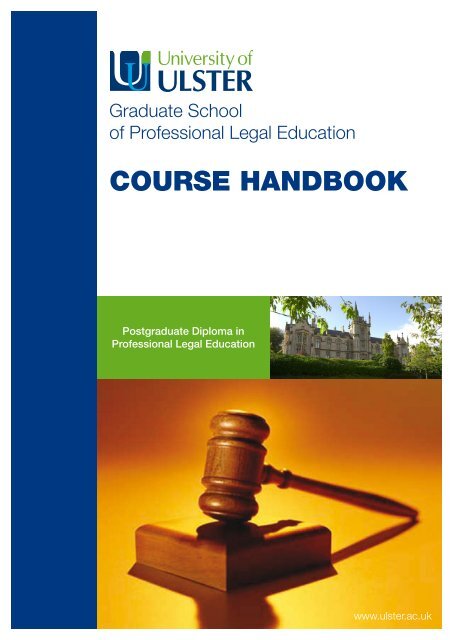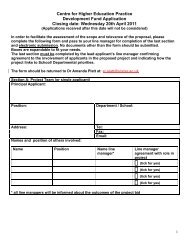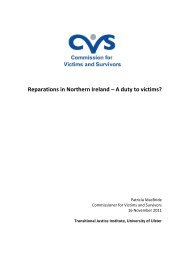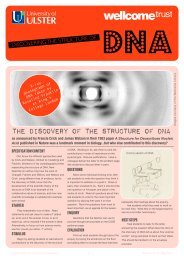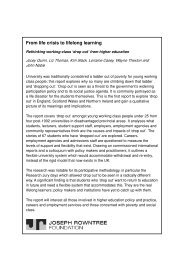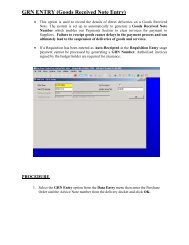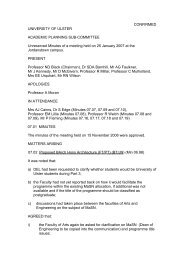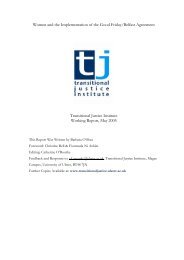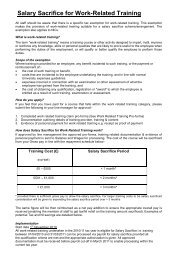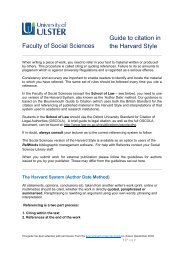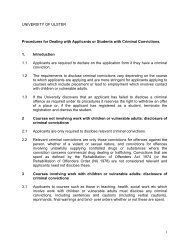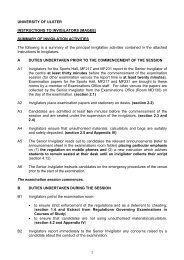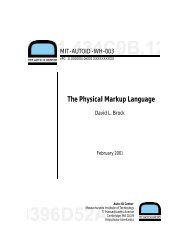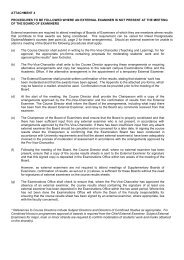Graduate School of Professional Legal Education - Faculty of Social ...
Graduate School of Professional Legal Education - Faculty of Social ...
Graduate School of Professional Legal Education - Faculty of Social ...
Create successful ePaper yourself
Turn your PDF publications into a flip-book with our unique Google optimized e-Paper software.
<strong>Graduate</strong> <strong>School</strong><br />
<strong>of</strong> Pr<strong>of</strong>essional <strong>Legal</strong> <strong>Education</strong><br />
Course Handbook<br />
Postgraduate Diploma in<br />
Pr<strong>of</strong>essional <strong>Legal</strong> <strong>Education</strong><br />
www.ulster.ac.uk
UNIVERSITY OF ULSTER<br />
FACULTY OF SOCIAL SCIENCES<br />
GRADUATE SCHOOL OF PROFESSIONAL LEGAL EDUCATION<br />
POSTGRADUATE DIPLOMA IN LEGAL PRACTICE<br />
Accredited by the Law Society <strong>of</strong> Northern Ireland<br />
COURSE HANDBOOK<br />
Course Code: 5040<br />
Course Director: Ms Diane Nixon<br />
Academic Year 2012-2013<br />
Part I - Student Handbook<br />
Part II - Course Regulations are included in Course Handbook<br />
IT IS YOUR RESPONSIBILITY TO ENSURE THAT YOU OBTAIN THESE<br />
PARTS OF THE HANDBOOK
Disclaimer<br />
Details <strong>of</strong> the Course are set out in this Handbook. The University will use all<br />
reasonable endeavours to deliver the course in accordance with the descriptions<br />
set out. However the University does not provide education on a commercial<br />
basis and is largely dependent on public and charitable funds, which the<br />
University has to manage in a way which is efficient and cost-effective, in the<br />
context <strong>of</strong> the provision <strong>of</strong> a diverse range <strong>of</strong> courses to a large number <strong>of</strong><br />
students. The University therefore reserves the right to make variations in the<br />
content or method <strong>of</strong> delivery or assessment or other course changes if such<br />
action is reasonably considered necessary by the University in the context <strong>of</strong> its<br />
wider purposes.<br />
Retention <strong>of</strong> Information<br />
You are advised that you should retain this Handbook and associated module<br />
handbooks for future reference. You may be asked to provide documentary<br />
evidence <strong>of</strong> modules taken and their content by potential employers or in<br />
connection with an application to undertake further study. The University can<br />
provide such details from its records, but will make a charge to cover the costs<br />
involved in conducting searches and supplying information.<br />
2
CONTENTS Page No.<br />
Welcome from the Director 4<br />
Introduction 5<br />
Members <strong>of</strong> Staff 6<br />
The <strong>Graduate</strong> <strong>School</strong> Office 7<br />
The Course<br />
The Course Structure and Requirements for the Award<br />
Course Content<br />
The Modules<br />
3<br />
8<br />
8<br />
9<br />
10 - 13<br />
Learning Teaching & Assessment 14 -18<br />
Coursework & Examinations 19- 21<br />
Student Support & Pastoral Care 22 - 25<br />
Provision for Student Feedback 26 – 28<br />
Assessment Criteria<br />
Regulations for Postgraduate Diploma in <strong>Legal</strong> Practice<br />
29 - 30<br />
31 - 37<br />
Teaching and Learning Support Charter 38 - 46
Welcome from the Director<br />
Welcome to the <strong>Graduate</strong> <strong>School</strong> <strong>of</strong> Pr<strong>of</strong>essional <strong>Legal</strong> <strong>Education</strong>. The<br />
<strong>Graduate</strong> <strong>School</strong> is the sole provider <strong>of</strong> pr<strong>of</strong>essional legal education in the North-<br />
West and only the second provider in Northern Ireland.<br />
The <strong>Graduate</strong> <strong>School</strong> provides places for 28 students wishing to obtain the<br />
Postgraduate Diploma in <strong>Legal</strong> Practice which will enable them to qualify as<br />
solicitors. The <strong>School</strong> has a team <strong>of</strong> experienced legal pr<strong>of</strong>essionals, both<br />
solicitors and barristers, to deliver the core subjects <strong>of</strong> the course. In addition we<br />
invite leading practitioners from the North-West and across Northern Ireland to<br />
give the students the benefit <strong>of</strong> their pr<strong>of</strong>essional experience. The <strong>School</strong> works<br />
closely with the Law Society to ensure that the course meets the requirements <strong>of</strong><br />
the legal pr<strong>of</strong>ession.<br />
The <strong>Graduate</strong> <strong>School</strong> seek to provide a pr<strong>of</strong>essional education for the<br />
pr<strong>of</strong>essional lives our students will lead. The focus <strong>of</strong> the course is on equipping<br />
students with the necessary practical skills to discharge their pr<strong>of</strong>essional<br />
functions as solicitors. This includes negotiation, advocacy, and drafting legal<br />
documents. We seek to create an interactive and innovative learning<br />
environment and expect our students to make a major contribution to that<br />
process.<br />
PAUL MAGEEAN<br />
Director<br />
<strong>Graduate</strong> <strong>School</strong> <strong>of</strong> Pr<strong>of</strong>essional <strong>Legal</strong> <strong>Education</strong><br />
4
The Postgraduate Diploma in <strong>Legal</strong> Practice at Magee<br />
Introduction<br />
The Postgraduate Diploma in Pr<strong>of</strong>essional <strong>Legal</strong> Practice on which you have<br />
been enrolled has been designed and developed in partnership with the Law<br />
Society <strong>of</strong> Northern Ireland to meet the needs <strong>of</strong> the solicitors’ pr<strong>of</strong>ession in a<br />
rapidly changing legal environment. The provision <strong>of</strong> vocational legal education<br />
at the University <strong>of</strong> Ulster will complement the range <strong>of</strong> undergraduate and<br />
postgraduate courses already firmly embedded in this University, and will allow<br />
us to provide the entire range <strong>of</strong> legal education, both academic and<br />
pr<strong>of</strong>essional.<br />
The course fits within the two-year educational model established by the<br />
Solicitors Admission and Training Regulations 1998 (as amended), which are<br />
made pursuant to the Solicitors (Northern Ireland) Order 1976. As you will be<br />
aware, these Regulations prescribe a two-year period <strong>of</strong> apprenticeship which<br />
begins on 1 September in the year <strong>of</strong> admission. Training is carried out in your<br />
Master’s <strong>of</strong>fice until December following which you will complete the academic<br />
course four days per week and attend your Master’s <strong>of</strong>fice one day per week<br />
(Monday) plus holidays. The final eight months are also spent in your Master’s<br />
<strong>of</strong>fice. Successful completion <strong>of</strong> the two year apprenticeship and academic<br />
course will entitle you to be enrolled on the Roll <strong>of</strong> Solicitors in Northern Ireland.<br />
5
Members <strong>of</strong> Staff<br />
Staff (<strong>Graduate</strong> <strong>School</strong>)<br />
Paul Mageean, LLB, LLM, Solicitor<br />
Tel: (028) 7167 5429<br />
Email: p.mageean@ulster.ac.uk<br />
Anne Brown, LLB, BCL (Oxon), MA TESOL,<br />
Solicitor<br />
Tel: (028) 7167 5331<br />
Email: am.brown@ulster.ac.uk<br />
Catherine Nixon, LLB, Solicitor<br />
Tel: (028) 7167 5309<br />
Email: cf.nixon@ulster.ac.uk<br />
Diane Nixon, MA, Dip.Soc., Barrister-at-Law<br />
Tel: (028) 7167 5280<br />
Email: de.nixon@ulster.ac.uk<br />
Christopher Coyle, LLB, LLM, Barrister-at-<br />
Law<br />
Tel: (028) 7167 5292<br />
Email: cpm.coyle@ulster.ac.uk<br />
Emile Daly,<br />
Tel: (028) 7167 5274<br />
Email: e.daly@ulster.ac.uk<br />
Christine Stewart<br />
Tel: (028) 7167 5485<br />
Email: c.stewart1@ulster.ac.uk<br />
Helena Devine<br />
Tel: (028) 7167 5222<br />
Email: h.devine@ulster.ac.uk<br />
6<br />
Director <strong>of</strong> the <strong>Graduate</strong> <strong>School</strong><br />
Senior Lecturer in <strong>Legal</strong> Practice<br />
Senior Lecturer in <strong>Legal</strong> Practice<br />
Lecturer in <strong>Legal</strong> Practice<br />
Lecturer in <strong>Legal</strong> Practice<br />
Lecturer in <strong>Legal</strong> Practice<br />
<strong>School</strong> Administrative Assistant<br />
Clerical Assistant
The <strong>Graduate</strong> <strong>School</strong> Office<br />
The <strong>Graduate</strong> <strong>School</strong> <strong>of</strong>fice is situated on the top floor in MG Building and will be<br />
open during normal <strong>of</strong>fice hours.<br />
Please use the <strong>School</strong> Office to:<br />
Hand in coursework (Note: you may NOT hand in coursework anywhere<br />
else)<br />
Leave post or hand delivered messages for members <strong>of</strong> staff<br />
Make appointments to see members <strong>of</strong> staff<br />
Make general enquiries<br />
There is also a <strong>School</strong> notice board in the computer suite above the main<br />
teaching area which will be used to display important information about the<br />
course. Please check the notice board regularly.<br />
You may also receive information about the course via text message so if you<br />
change your mobile phone number please let the <strong>School</strong> <strong>of</strong>fice know.<br />
Contacting Members <strong>of</strong> Staff<br />
All members <strong>of</strong> academic staff are available to see students upon arrangement.<br />
You can make an appointment through the <strong>School</strong> Office or directly with the<br />
member <strong>of</strong> staff. It is important to remember that the academic staff work within<br />
the <strong>School</strong> on an associate or part-time basis. This is to enable them to continue<br />
to practice.<br />
You may also telephone or email the member <strong>of</strong> staff (contact details are listed<br />
on page 6 <strong>of</strong> this document) or you may leave a message for him or her in the<br />
<strong>School</strong> Office. Please remember that staff are busy people and will reply to your<br />
message or request as soon as they can. Repeatedly calling or emailing<br />
someone may only add to the burden and probably delay a response.<br />
.<br />
7
THE COURSE<br />
We deliver a student-centred skills based course, which aims to develop the<br />
skills that you will require in practice in addition to developing a knowledge base.<br />
We thus aim to provide you with a platform from which you may acquire the<br />
necessary skills through practical exercises based upon typical scenarios that<br />
are likely to arise in practice.<br />
You will interview ‘clients’, draft legal documents and correspondence, read<br />
example materials and documents received in a solicitor’s <strong>of</strong>fice, make decisions<br />
regarding the future conduct <strong>of</strong> fictional cases – all steps to emulate real life in a<br />
practice ins<strong>of</strong>ar as possible. It will be a more participative environment for<br />
students than you will have experienced in undergraduate studies, in which you<br />
will encounter ethical and substantive issues in a learning environment which will<br />
be exciting, meaningful and relevant for students.<br />
The Course Structure and Requirements for the Award<br />
The course is modular in design. There are ten modules (listed in the table<br />
below), some <strong>of</strong> which will also be divided into individual short courses. Each <strong>of</strong><br />
the ten modules represents 10 or 20 credit points providing a total <strong>of</strong> 140 credit<br />
points. In order to successfully complete the Postgraduate Diploma you will need<br />
to successfully complete all ten modules, thereby attaining a total <strong>of</strong> 140 credit<br />
points. There will not be a choice in modules.<br />
A number <strong>of</strong> the modules will straddle both semesters and, for administrative<br />
purposes, may receive the suffix 1 and 2.<br />
The course comprises the following modules, some <strong>of</strong> which will be divided into<br />
individual short courses.<br />
8
Module Title Credit Credit Module<br />
Level Points Status<br />
Conveyancing 7 20 Compulsory<br />
Wills and Probate 7 20 Compulsory<br />
Civil Litigation 1 7 10 Compulsory<br />
Civil Litigation 2 7 10 Compulsory<br />
Criminal Procedure 7 20 Compulsory<br />
Business and<br />
Commercial Practice and<br />
Procedure<br />
Course Content<br />
7 20 Compulsory<br />
Financial Management 7 10 Compulsory<br />
Skills 7 10 Compulsory<br />
Practice Management 7 10 Compulsory<br />
The <strong>Education</strong>al Aims and Objectives <strong>of</strong> the Course<br />
The course aims to build on your prior learning and provide you with the<br />
following:<br />
A range <strong>of</strong> practical skills and a knowledge base necessary to equip you<br />
to enter practice as a solicitor<br />
An understanding <strong>of</strong> the application <strong>of</strong> law in practice<br />
An appreciation <strong>of</strong> the concept <strong>of</strong> pr<strong>of</strong>essionalism and ethics in line with<br />
current pr<strong>of</strong>essional standards<br />
An ability to bridge the gap between the academic study <strong>of</strong> law and the<br />
practice <strong>of</strong> law<br />
An ability effectively to communicate with clients, lawyers and non-lawyers<br />
in a pr<strong>of</strong>essional capacity<br />
An understanding and appreciation <strong>of</strong> the need to take future responsibility<br />
for their own pr<strong>of</strong>essional development<br />
A qualification recognised by the Law Society for NI.<br />
9<br />
Awards<br />
Pr<strong>of</strong>essional Ethics and<br />
Conduct<br />
7 10 Compulsory<br />
Total 140 Postgraduate<br />
Diploma
The Modules<br />
A summary <strong>of</strong> the content delivered within each module <strong>of</strong> the course is set out<br />
below. A short handbook for each module will be provided at the start <strong>of</strong> that<br />
module. It will provide more detailed information on how the module will be<br />
delivered. This will enable you to better manage and pace your learning.<br />
Conveyancing<br />
Taking instructions<br />
Reading and understanding title<br />
Enquiries and searches<br />
The contract/general and special conditions/creation <strong>of</strong> a binding contract<br />
Pre-completion/completion and post completion steps<br />
Remedies<br />
Delays or failure to complete in accordance with contract<br />
Easements, rights and covenants<br />
Leases – grant and assignment <strong>of</strong> leases<br />
Commercial leases<br />
Ethics in conveyancing<br />
Costs, funding<br />
Wills and Probate<br />
Taking instructions, drafting wills, appointment <strong>of</strong> executors, types <strong>of</strong><br />
legacy and disposition<br />
Execution <strong>of</strong> wills<br />
Alterations, codicils, revocation<br />
Elderly clients, capacity and powers <strong>of</strong> attorney<br />
Office <strong>of</strong> Care and Protection<br />
Tax planning<br />
Extraction <strong>of</strong> grant <strong>of</strong> probate or grant <strong>of</strong> administration<br />
Administration <strong>of</strong> estates<br />
Applications under the inheritance provisions<br />
Costs, funding<br />
Civil Litigation 1<br />
• Industrial and Fair Employment Tribunal procedure<br />
• Basic procedure in family courts – Article 8 order applications, divorce,<br />
applications for financial provision, Public Law Children Order applications<br />
• Jurisdiction <strong>of</strong> the Courts and international jurisdiction issues<br />
• Costs, funding, legal aid<br />
10
• The retainer, conduct issues, use <strong>of</strong> counsel<br />
Civil Litigation 2<br />
An introduction to civil litigation, court structure, venue, an overview <strong>of</strong> the<br />
action<br />
Methods <strong>of</strong> resolving disputes, litigation, & ADR<br />
Jurisdiction <strong>of</strong> the Courts and international jurisdiction issues<br />
Costs, funding, legal aid<br />
The retainer, conduct issues, use <strong>of</strong> counsel<br />
Human Rights Act 1998 and its impact on civil litigation<br />
Elements <strong>of</strong> causes <strong>of</strong> action, limitation, damages and remedies<br />
Evidence<br />
Experts and witnesses, statements <strong>of</strong> evidence<br />
Drafting pleadings and letters <strong>of</strong> claim<br />
Issue and service <strong>of</strong> proceedings including service out <strong>of</strong> the jurisdiction<br />
Interlocutory proceedings including Discovery, interrogatories and<br />
inspection<br />
Seeking judgment<br />
Preparation for trial<br />
Trial procedure<br />
Appeals<br />
Enforcement procedure<br />
Basic Judicial Review procedure<br />
Licensing<br />
Criminal Damage<br />
Rules <strong>of</strong> Court and Practice Directions<br />
Criminal Procedure<br />
Basic Principles – Statutes, the Common Law and other Fundamental<br />
Resources<br />
Visits to Police Station and PACE Interviews<br />
Taking instructions<br />
Pre-trial Issues – Disclosure, Defence Statements, Pro<strong>of</strong>s and Abuse <strong>of</strong><br />
Process etc.<br />
Summary trial procedure<br />
Trial on indictment procedure<br />
Sentencing practice and procedure<br />
Bail and remands<br />
Appeals to County Courts and Court <strong>of</strong> Appeal<br />
Evidence in criminal trials – Overview <strong>of</strong> the Basic Rules, The Criminal<br />
Justice (Evidence) (Northern Ireland) Order 2004 and Challenging<br />
Admissibility<br />
Role <strong>of</strong> counsel<br />
11
Role <strong>of</strong> solicitors in advocacy – Solicitor Advocates<br />
Practical Issues and the Ethics <strong>of</strong> Practice<br />
Youth Court practice and procedure<br />
Implications <strong>of</strong> the Human Rights Act 1998 for criminal practice and<br />
procedure<br />
Rules <strong>of</strong> Court and Practice Directions<br />
Costs, funding, legal aid<br />
Business & Commercial Practice and Procedure<br />
Partnerships - creation, running <strong>of</strong> the partnership and dissolution<br />
Limited liability partnerships<br />
Company incorporation, statutory duties in running company, shareholder<br />
and directors rights and responsibilities<br />
Administration and winding up <strong>of</strong> company<br />
Company searches<br />
<strong>Legal</strong> responsibilities in running a business - tax, insurance<br />
Company and partnership accounts<br />
Basic insolvency procedure – statutory demands, setting aside a statutory<br />
demand, bankruptcy petition and bankruptcy orders, bankruptcy searches<br />
Companies – winding up<br />
IVA’s<br />
Financial Management<br />
Entries to the accounts<br />
Office accounts<br />
Double entries system<br />
Balance Sheet<br />
Pr<strong>of</strong>it and loss account<br />
Regulations<br />
Money laundering and Proceeds <strong>of</strong> Crime<br />
Ethics in financial management<br />
Practice Management<br />
Risk Management<br />
Time management<br />
File management<br />
Secure documents – deeds, wills<br />
Dealing with people within the <strong>of</strong>fice environment<br />
Employer practices, policies and procedural requirements including Fair<br />
Employment requirements and returns, Health and Safety practices,<br />
contracts <strong>of</strong> employment, appraisals<br />
12
Pr<strong>of</strong>essional Ethics and Conduct<br />
Skills<br />
Role <strong>of</strong> solicitor as an <strong>of</strong>ficer <strong>of</strong> the Court<br />
Role <strong>of</strong> solicitor in dealing with clients including letters <strong>of</strong> engagement<br />
Role <strong>of</strong> solicitor in dealing with counsel, the court, legal and other<br />
pr<strong>of</strong>essionals and third parties<br />
Statements and undertakings made by solicitors<br />
Money laundering and proceeds <strong>of</strong> crime<br />
Transfer <strong>of</strong> files between solicitors<br />
Effecting court settlements and appropriate advice to client.<br />
Costs<br />
The role <strong>of</strong> a solicitor in dealing with vulnerable clients<br />
Complaints<br />
Disciplinary procedures <strong>of</strong> the Law Society<br />
Role <strong>of</strong> the Money Laundering Reporting Officer<br />
Rules and canons <strong>of</strong> pr<strong>of</strong>essional conduct<br />
Oral negotiation<br />
Negotiating<br />
Drafting legal documents and letters<br />
Interviewing<br />
Marshalling facts<br />
Advocacy<br />
13
LEARNING TEACHING & ASSESSMENT<br />
You will find that we focus upon imparting the knowledge and nurturing the skills<br />
necessary for quality pr<strong>of</strong>essionals. You will be introduced to the theory and<br />
practice <strong>of</strong> law and encouraged to think and reason critically. The relatively small<br />
class sizes should make discussion in classes easier and you will find that any<br />
difficulties you may encounter are quickly addressed. A range <strong>of</strong> teaching<br />
methods allows for a focused application <strong>of</strong> the skills and knowledge you will<br />
have gained at undergraduate level to practical exercises and projects to prepare<br />
you, as much as possible in a simulated environment, for practice.<br />
Teaching Methods<br />
The principal teaching methods on this course are lectures, seminars and<br />
independent learning. The lectures are largely expository, but student<br />
participation, in the form <strong>of</strong> question and answer sessions, is encouraged. The<br />
topics covered in the lectures will be discussed in seminars that follow. You are<br />
expected to prepare for lectures and seminars in advance. Throughout the<br />
course you will be expected to take part in a range <strong>of</strong> activities, including mocktrials,<br />
moots, oral and written presentations, and group work.<br />
Seminars<br />
It is essential for all concerned that there is active participation in seminars. If<br />
you are asked to study a particular problem or to read something in advance <strong>of</strong><br />
the seminar, you should do this and not just hope that someone else will have<br />
done the work and you will be able to avoid answering questions.<br />
Transactional based learning<br />
This will consist <strong>of</strong> learning that is based on transactions or cases simulated on<br />
legal practice. The transactions or cases will evolve over time with various<br />
events and legal occurrences taking place and simulating in as much as possible<br />
a real case in an <strong>of</strong>fice environment. You will carry out a variety <strong>of</strong> types <strong>of</strong><br />
activities concerning the simulated transaction or case including drafting,<br />
presentation, advocacy, interviewing exercises.<br />
Blackboard<br />
Blackboard technology is used at the University <strong>of</strong> Ulster to give students and<br />
staff a complete learning environment, including personalised online access to<br />
course material, university library systems, academic and student support<br />
programs, and electronic communication tools.<br />
14
This format can be used to present teaching material for students; arrange<br />
multiple-choice quizzes and questionnaires. Online teaching sources and other<br />
materials available on the internet can be presented. By accessing these, you will<br />
not only obtain reading material but also become conversant with information<br />
technology - a valuable transferable skill.<br />
CD, DVD and Video Materials<br />
CD, DVD and video materials will be used particularly in the area <strong>of</strong> skills eg<br />
interviewing, where good practice may be demonstrated through this medium. It<br />
is planned that we will also build up a bank <strong>of</strong> self-made DVDs for learning and<br />
demonstration purposes.<br />
In addition it is intended to video students as each <strong>of</strong> you carry out certain role<br />
plays in order to enhance the ability to give feedback.<br />
Assessment and Examinations<br />
A range <strong>of</strong> assessment methods will be used, but most modules require you to sit<br />
an examination. Coursework is assessed in a variety <strong>of</strong> ways, including<br />
presentations, mock-trials, moots, and drafting various documents. Most staff<br />
members customise these benchmarks to suit the content <strong>of</strong> their module. All<br />
marking is moderated (both by another member <strong>of</strong> staff and a panel <strong>of</strong> external<br />
examiners to ensure fairness and reliability in the final mark). Your coursework<br />
will be returned to you with feedback.<br />
Students must complete and pass each obligatory module. There is no provision<br />
for exemption or condonement in the course regulations.<br />
The pass mark shall be 50% for each assessment element and for each module<br />
overall.<br />
Assessment Criteria<br />
Assessment criteria for this course are included in this handbook at page 29/30.<br />
Trainees should familiarise themselves with these and also with the individual<br />
module descriptions which will be given to them for each module. Trainees<br />
should also read the University-wide Level 7 assessment criteria for courses<br />
which are available at:<br />
http://www.ulster.ac.uk/academic<strong>of</strong>fice/download/Handbooks/Assessment<br />
Handbook.pdf<br />
15
Classification <strong>of</strong> Final result<br />
The following shall be the minimum percentages acceptable in determining the<br />
overall gradings <strong>of</strong> candidates.<br />
Pass with Distinction 70%<br />
Pass 50%<br />
The Board <strong>of</strong> Examiners shall recommend the award <strong>of</strong> a Pass with Distinction to<br />
a candidate who achieves an overall average mark <strong>of</strong> at least 70%.<br />
Table showing assessment breakdown per module<br />
Module Title Credit<br />
Value<br />
Assessment Methods Contribution<br />
to the overall<br />
mark <strong>of</strong> the<br />
Final Award<br />
% Examination % Coursework<br />
%<br />
Conveyancing 20 80 20 14.28<br />
Wills and Probate 20 80 20 14.28<br />
Civil Litigation 1 10 80 20 7.15<br />
Civil Litigation 2 10 80 20 7.15<br />
Criminal Procedure 20 80 20 14.28<br />
Business &<br />
Commercial<br />
Practice and<br />
Procedure<br />
Financial<br />
Management<br />
20 80 20 14.28<br />
10 100 0 7.15<br />
Skills 10 0 100 7.15<br />
Practice<br />
Management<br />
Pr<strong>of</strong>essional Ethics<br />
and Conduct<br />
10 0 100 7.15<br />
10 0 100 7.15<br />
16
Exit Exam<br />
An Exit Exam will be held at the end <strong>of</strong> the course. The exam will be synoptic in<br />
nature in that it will test the students’ knowledge <strong>of</strong> material learnt throughout the<br />
course. Students will have to pass the exit exam in order to be awarded the<br />
Postgraduate Diploma but the exit exam mark will not go towards the final mark<br />
in the Postgraduate Diploma. The exit exam will be marked on a Pass/Fail basis<br />
only.<br />
Plagiarism<br />
The University does NOT tolerate plagiarism <strong>of</strong> other people’s work. Such<br />
behaviour is not only outside the spirit <strong>of</strong> the pr<strong>of</strong>ession, it is also an <strong>of</strong>fence<br />
under the University’s disciplinary code and could well be an infringement <strong>of</strong><br />
copyright. You will be severely penalised if you are found to have plagiarised<br />
work. A first-<strong>of</strong>fence will precipitate an interview with the module co-ordinator<br />
and the Director. Subsequent <strong>of</strong>fences will trigger disciplinary proceedings.<br />
Time Table for the Course<br />
The provisional time table for the Spring Semester starting January 2013<br />
(Semester 2) is provided separately. The time table for the Autumn Semester<br />
(Semester 1 2013/14) will be provided later.<br />
Attendance and behaviour<br />
The <strong>Graduate</strong> <strong>School</strong>’s purpose is to provide pr<strong>of</strong>essional education. We<br />
therefore expect pr<strong>of</strong>essional standards <strong>of</strong> behaviour from our students.<br />
Attendance at all teaching events within the proposed course is compulsory and<br />
you will be expected to be punctual. Attendance will be monitored at lectures,<br />
seminars and visits to other establishments. The University and the Law Society<br />
regard poor attendance as a very serious issue. In the event <strong>of</strong> an unavoidable<br />
absence, a Notification <strong>of</strong> Absence Form (NA1) must be completed. It is<br />
available from the University web-site or from the <strong>School</strong>.<br />
Any student missing more than 3 classes will be reported by the Module Coordinator<br />
to the Director who will write to the student requesting an explanation<br />
for absences. Should you wish to take holiday leave you must take this outside <strong>of</strong><br />
the <strong>Graduate</strong> <strong>School</strong>’s teaching terms and this should also be in agreement with<br />
your Master. Any further absences will require an interview with the Director with<br />
the possibility <strong>of</strong> a range <strong>of</strong> sanctions being imposed including possible referral to<br />
17
a Law Society / University Disciplinary Committee. This Committee will have a<br />
range <strong>of</strong> serious sanctions at its disposal.<br />
Students will also be expected to switch <strong>of</strong>f mobile phones and other electronic<br />
equipment during classes at the <strong>Graduate</strong> <strong>School</strong>. Students are not permitted to<br />
record classes.<br />
In addition, pr<strong>of</strong>essional standards <strong>of</strong> behaviour will be expected during classes<br />
and particularly when guest speakers or tutors attend the <strong>School</strong> or when we are<br />
visiting local courthouses, or other institutions. Students will also be expected to<br />
dress appropriately on these occasions and when engaged in mock trials and<br />
other exercises in the <strong>Graduate</strong> <strong>School</strong>. Guidance will be given to students on<br />
this matter during the course.<br />
Library Services and Facilities<br />
The Learning Resource Centre (LRC) was opened on the Magee campus in<br />
2003. The LRC provides enhanced study and IT facilities which include<br />
networked user desks and access to group study and seminar rooms. For<br />
information on the resources available within the library see:<br />
http://library.ulster.ac.uk<br />
Please note there will be a library and IT services induction session in January<br />
2013. This will include input from the Law Society librarian.<br />
Attendance at this induction session is COMPULSORY and attendance will be<br />
monitored.<br />
<strong>Faculty</strong> Support Librarians<br />
Library Contacts for Law<br />
Subject Librarian (Cross-Campus)<br />
Niall Burns<br />
(028) 9036 6970<br />
nd.burns@ulster.ac.uk<br />
18<br />
Assistant Librarian (Magee Campus)<br />
Janice McQuilken<br />
(028) 7167 5066<br />
j.mcquilken@ulster.ac.uk<br />
A detailed guide to library services and facilities is available and all new students<br />
are provided with a copy as part <strong>of</strong> the induction programme.
COURSEWORK & EXAMS – LATE SUBMISSIONS & RESITS<br />
1. Coursework MUST be submitted by the deadline given and in the manner<br />
stipulated by the <strong>Graduate</strong> <strong>School</strong>, i.e. typed copies submitted and signed for at<br />
the <strong>Graduate</strong> <strong>School</strong> Office;<br />
2. If you wish to apply for a first-sit <strong>of</strong> an examination or to submit coursework late<br />
due to extenuating circumstances, you must make such an application in writing by<br />
filling out an EC1 form, available from the <strong>Graduate</strong> <strong>School</strong> Office. EC1 Forms are<br />
also available online at<br />
http://wwwulster.ac.uk/academicservices/student/examinations.html<br />
3. Do NOT assume that your application has been granted just because you have<br />
submitted an EC1 Form – you MUST check with the relevant member <strong>of</strong> staff to<br />
see if it has been accepted;<br />
4. Your application must meet ALL <strong>of</strong> the following conditions and if it does not your<br />
application will be refused<br />
a. A completed EC1 Form MUST be submitted. Failure to submit a completed<br />
EC1 Form will result in the automatic rejection <strong>of</strong> your application;<br />
b. State clearly on the form the reason for your application;<br />
c. State clearly the module(s) to which your application relates. Include the<br />
module codes;<br />
d. State clearly the outcome(s) you are seeking. If you do not specify an<br />
outcome we will assume you do not wish any action to be taken and you are<br />
just drawing the matter to our attention.<br />
e. If your application is on the basis <strong>of</strong> medical unfitness or other medical<br />
reasons you MUST supply medical evidence (see 5 below);<br />
f. You should note that the following are not valid reasons for extensions and<br />
you will not be granted an extension for these:<br />
i. Computer, IT, printer or s<strong>of</strong>tware failure;<br />
ii. Failure to manage your time sufficiently;<br />
iii. Bereavements other than those <strong>of</strong> immediate family members or<br />
close friends. You may be asked to provide verification <strong>of</strong><br />
bereavements.<br />
g. Applications for first-sits in examinations must be submitted within 5 DAYS<br />
<strong>of</strong> the examination concerned. Any evidence presented after this CANNOT<br />
AND WILL NOT BE TAKEN INTO ACCOUNT by Examination & Progress<br />
Boards.<br />
5. The ONLY form <strong>of</strong> medical evidence that will be accepted by the Course<br />
Committee is a completed medical certificate or full doctor’s letter. The certificate<br />
must be in the form <strong>of</strong> a standard medical certificate form, stating in a LEGIBLE<br />
fashion the nature <strong>of</strong> the illness and SIGNED by your doctor and STAMPED by the<br />
relevant medical practice. If the evidence is a doctor’s letter, it should be on that<br />
practice’s or hospital’s headed notepaper and legible. We have to be able to<br />
identify the doctor’s name and the name, address and contact number <strong>of</strong> the<br />
practice as well as the medical circumstances in order for the certification to be<br />
19
valid. Please note that NO other form <strong>of</strong> sick certificate will be accepted and if you<br />
submit another type <strong>of</strong> note (e.g. compliments slip, scribbled note etc.) your<br />
medical circumstances WILL NOT be taken into account.<br />
6. EC1s and accompanying evidence should be handed in to the <strong>Graduate</strong> <strong>School</strong><br />
Office, not handed or posted to academic staff.<br />
APPEALS<br />
You have the right to appeal, in appropriate circumstances, against a decision <strong>of</strong><br />
a Board <strong>of</strong> Examiners. Appeals are made to an Appeals Panel. An Appeals<br />
Panel cannot make academic judgments, that is, it cannot change your marks to<br />
enable an assessment to be passed or the classification <strong>of</strong> an award to be<br />
changed. Instead, if your appeal is upheld you will be permitted to complete,<br />
take, or repeat the assessment, which, if you successful, will enable you to<br />
complete the course.<br />
An appeal may be based either:<br />
(a) On new information about extenuating circumstances which were not<br />
known to the Board when it made its original decision; or<br />
(b) On a procedural or other irregularity<br />
There are matters which are not open to review through the appeals procedure.<br />
These include:<br />
(a) Challenges to the academic judgment <strong>of</strong> the examiners on your<br />
performance; or<br />
(b) Complaints about the delivery or management <strong>of</strong> the course after you<br />
have presented yourself for examination; you should raise such concerns<br />
through the University’s complaints procedures at an earlier stage as soon<br />
as they arise.<br />
The Panel will not consider your appeal if it is considered to be vexatious or<br />
frivolous.<br />
The deadlines by which appeals must be lodged with the Examinations Office are<br />
set out in the Notes for Examination Candidates published on the Academic<br />
Registry Office notice board at Magee.<br />
If you need further advice or guidance on these procedures you should contact<br />
the Examinations Officer. The Examinations Officer for Magee is Margaret<br />
Martin, Room MD130, Telephone (028) 7167 5419. You may also obtain advice<br />
from the Students’ Union at (028) 7167 5218 and the Student Support<br />
Department at (028) 7167 5290.<br />
20
PLEASE NOTE: Academic staff WILL NOT discuss your appeal with you NOR<br />
will they advise you on how to conduct your appeal. If you approach a member<br />
<strong>of</strong> staff about this, you will be directed to discuss the matter directly with<br />
Academic Registry, to the University website for general information about the<br />
appeals process, and to the Students’ Union for help in preparing the appeal.<br />
21
STUDENT SUPPORT & PASTORAL CARE<br />
Pastoral Care<br />
The University has in place an established system <strong>of</strong> pastoral care in its widest<br />
sense. The objective <strong>of</strong> this system is to ensure that all students receive the<br />
academic, social and personal support required to enable them to benefit fully<br />
from their studies. The system can be broken down into a number <strong>of</strong> elements.<br />
Studies Advice<br />
Each student is allocated a member <strong>of</strong> staff to provide advice and pastoral care.<br />
That member <strong>of</strong> staff (so far as is practical) remains Studies Adviser for the<br />
duration <strong>of</strong> the student’s time at the University, which ensures that a solid<br />
relationship is developed and allows the member <strong>of</strong> staff to properly advise<br />
course committees and exam boards <strong>of</strong> the students’ circumstances. Students<br />
meet with their Studies Adviser at least once a semester to discuss general<br />
progress. It is the responsibility <strong>of</strong> the Studies Advisor to encourage the student<br />
to participate in the arrangements for a Personal Development Programme<br />
(PDP).<br />
Each student will meet their Studies Adviser regularly in an informal setting to<br />
discuss any problems which have arisen within the course. Part <strong>of</strong> the aim <strong>of</strong> the<br />
studies advisory system is to complement the work undertaken by individual<br />
Module Co-ordinators. The system gives an individual student the opportunity to<br />
evaluate and monitor performance in the course as a whole. In performing their<br />
duties, Studies Advisers follow the Code <strong>of</strong> Practice issued to them by the<br />
University.<br />
Study Support<br />
Study Support commences with the induction period in which colleagues from the<br />
Learning Resources Centre and IT User Services provide an initial overview <strong>of</strong><br />
Library services and a practical introduction to relevant s<strong>of</strong>tware. This process is<br />
continued in the modules in Semester 1 and, a few weeks into the semester,<br />
Subject Librarians also provide detailed subject based library seminars, focusing<br />
on resources relevant to each course.<br />
On-going study support is provided by Student Support and by Studies Advisers.<br />
Each advisor is made aware <strong>of</strong> the available student support services. Library<br />
staff are available to <strong>of</strong>fer sessions on specific aspects <strong>of</strong> legal research and<br />
particularly online information by appointment with any member <strong>of</strong> staff at any<br />
time <strong>of</strong> the year.<br />
22
General Student Support<br />
The University has a Department <strong>of</strong> Student Support which aims to help students<br />
to achieve the maximum benefit from their University life. Its purpose is to assist<br />
students, not only in relation to academic matters, but in their social and personal<br />
development, and to help them plan their future careers.<br />
Practical assistance and advice is available to students in the following areas:<br />
Accommodation Service<br />
Nursery Care<br />
Health Service<br />
Students Union<br />
Counselling & Guidance, including<br />
o The Counselling Service<br />
o Disability Support<br />
o <strong>Education</strong>al Guidance<br />
o The Support Fund<br />
o Chaplains<br />
o Sport and Recreation<br />
o Catering Services.<br />
Most students experience little difficulty in adapting and any problems they may<br />
encounter can usually be dealt with by Student Support. Students are introduced<br />
to the services available during the induction period.<br />
These inter-related services are made available by experienced pr<strong>of</strong>essional<br />
staff. They are strictly personal and confidential, and are aimed at ensuring the<br />
complete well being <strong>of</strong> the students. An overview <strong>of</strong> these services is provided<br />
below.<br />
Support For Students With A Disability<br />
The University has a Disability Statement and operates a Protocol for Students<br />
with a Disability. A Working Group on Student Disability, a Sub-Committee <strong>of</strong><br />
Student Support Committee, provides a forum for discussion <strong>of</strong> issues and<br />
collaborative projects. Staff in Disability Services will provide confidential<br />
assessment <strong>of</strong> additional study needs, communicating with academic staff as<br />
and when appropriate as to the nature <strong>of</strong> adaptations required to enable the<br />
student to access the learning environment. They will arrange funding and<br />
support for students according to their eligibility and monitor the support on an<br />
ongoing basis.<br />
23
Accommodation<br />
The Accommodation Service at Magee <strong>of</strong>fers 628 study bedrooms at three main<br />
sites, all <strong>of</strong> which are within easy walking distance <strong>of</strong> the main building. Coppin<br />
House on Strand Road has 72 bedrooms, all with individual wash hand basins,<br />
with shared use <strong>of</strong> kitchen and bathing facilities. There are a number <strong>of</strong> common<br />
rooms and other facilities for shared use. Duncreggan Phase 1 has 158<br />
bedrooms, arranged in five and six person flats, with private use <strong>of</strong> facilities and<br />
communal use <strong>of</strong> kitchens and bathrooms/showers and Duncreggan Phase 2 is<br />
the latest addition to the housing portfolio, and has 398 bedrooms, all en-suite,<br />
together with a number <strong>of</strong> common rooms and other facilities. Rental costs reflect<br />
the level <strong>of</strong> facilities available. All rooms at the above sites are self-catering, with<br />
facilities for food storage and preparation, and residential fees include heat,<br />
electricity, water charges and regular cleaning <strong>of</strong> communal areas.<br />
Counselling<br />
A confidential individual and group counselling and psychotherapy service is<br />
available for use by all students and staff members or their families. Depending<br />
on personal choice, the service can be used for brief or longer-term counselling<br />
and for dealing with any problems that might interfere with personal achievement<br />
and well-being.<br />
The Counselling Service may <strong>of</strong>fer, in conjunction with the <strong>Graduate</strong> <strong>School</strong>, a<br />
number <strong>of</strong> group workshops and skills acquisition classes during the academic<br />
year. These include: learning, study and examination workshops; relaxation and<br />
stress control sessions.<br />
A bereavement counselling service is also available to students.<br />
Health Services<br />
Qualified Nurses are available in the Student Health Centres at Magee to treat<br />
injuries, minor illnesses, and to advise on health matters. In addition there is an<br />
agreement with a local medical practice in order that students may receive<br />
advice and treatment.<br />
Financial Support<br />
Welfare Services administers a range <strong>of</strong> hardship funds, the most significant <strong>of</strong><br />
which is the Support Fund. These take the form <strong>of</strong> awards or interest free loans<br />
for students who find themselves in financial difficulty. Some <strong>of</strong> the schemes are<br />
means tested and all require evidence <strong>of</strong> income and expenditure.<br />
24
Chaplains<br />
Chaplains from all the main religious denominations are available to students.<br />
Crèche Facilities<br />
Crèches based on the Magee campus provides places for children aged from<br />
infancy to five years. Full day care (8.30 am to 5.30 pm Monday to Thursday;<br />
8.30 am to 4.30 pm Friday) is provided by trained staff in bright, comfortable and<br />
fully-equipped accommodation.<br />
25
PROVISION FOR STUDENT FEEDBACK<br />
Students’ Evaluation <strong>of</strong> Teaching<br />
Students are asked to participate in the Assessment <strong>of</strong> Teaching Student<br />
Questionnaire exercise. This is a confidential questionnaire on the quality <strong>of</strong> the<br />
teaching and learning experience provided by each member <strong>of</strong> the staff teaching<br />
in the context <strong>of</strong> a particular module. Comment is invited on a wide range <strong>of</strong><br />
issues including: the suitability <strong>of</strong> the location, the relevance <strong>of</strong> reading lists, the<br />
tutor’s style <strong>of</strong> delivery, the use <strong>of</strong> handout materials and teaching aids, and the<br />
speed <strong>of</strong> return <strong>of</strong> assignments. Each lecturer and his or her Head <strong>of</strong> <strong>School</strong> are<br />
informed <strong>of</strong> the outcome so that appropriate changes can take place. Summary<br />
analyses for <strong>School</strong>s, Faculties and the University as a whole are provided. If<br />
problems are identified then appropriate remedial action is discussed and<br />
implemented.<br />
Student Complaints Procedure<br />
The complaints procedure provides a facility for students to express<br />
dissatisfaction about any aspect <strong>of</strong> the services provided by the University,<br />
including actions or lack <strong>of</strong> actions by staff. The procedure seeks to provide an<br />
accessible, fair and straightforward system which enables students to raise<br />
concerns and which ensures an effective, timely and appropriate response.<br />
Further information on the complaints procedure can be found at<br />
http://www.ulster.ac.uk/quality/qmau/complaints.html<br />
Staff Student Consultative Committee Meetings<br />
Staff-student consultative meetings take place once a semester, are advertised<br />
in advance and provide a forum for student issues and concerns to be raised.<br />
Student representatives may also be elected on to the Course Committee.<br />
Feedback from students is therefore obtained formally by means <strong>of</strong> student-staff<br />
consultative meetings, by student representation on the Course Committee, and<br />
informally through students’ Studies Advisers.<br />
Equal Opportunities and Admissions Policy<br />
The <strong>Faculty</strong> <strong>of</strong> <strong>Social</strong> Sciences and its <strong>School</strong>s and Institutes wholly subscribe to<br />
the commitment by the University <strong>of</strong> Ulster to a working and learning<br />
environment that is free from unlawful and unjust discrimination and ensuring<br />
equality <strong>of</strong> opportunity. The University Charter states that:<br />
Persons shall not be excluded by reasons <strong>of</strong> religious belief, race or<br />
sex from admission as members <strong>of</strong> the University … or any<br />
26
advantage or privilege there<strong>of</strong>; preference shall not be given on the<br />
grounds <strong>of</strong> religious belief, political opinion, race or sex.<br />
The staff within the <strong>Faculty</strong> including all those in any way associated with this<br />
course fully embrace this Equal Opportunity Policy and seek to comply fully with<br />
the procedures and codes <strong>of</strong> practice as set out in the relevant policy documents.<br />
Students are advised on, and have access to, a number <strong>of</strong> sources <strong>of</strong> help which<br />
are documented in the University pamphlet on Equal Opportunities.<br />
All University staff have a responsibility to ensure the effective implementation <strong>of</strong><br />
the University’s Equal Opportunities Policy and Equality Scheme (which also<br />
covers Disability, Sexual Orientation, responsibility for dependents and age) and<br />
to assist in the prevention <strong>of</strong> discrimination. They must not discriminate against<br />
other employees or students and they must co-operate with measures introduced<br />
to promote equality <strong>of</strong> opportunity. The Course Committees will monitor<br />
applications for admission to the course and all aspects <strong>of</strong> course delivery in<br />
such a way as to ensure respect for this policy.<br />
All staff are required to undergo the University’s equality awareness training and<br />
are encouraged also to attend relevant internal and external training events in<br />
equality, disability and SENDO awareness.<br />
Admission Of Students With Disabilities<br />
It is the University policy to assess applications from persons with disabilities<br />
using academic criteria which apply to all candidates. In addition the following<br />
matters are taken into consideration:<br />
(a) the nature <strong>of</strong> the disability and its likely effect on the applicant’s<br />
entrance qualifications and level <strong>of</strong> preparation for entry to the course;<br />
(b) the nature <strong>of</strong> the disability and its likely consequences for the<br />
candidate’s ability to undertake the course;<br />
(c) the University’s ability to provide for the candidate’s personal needs<br />
in relation to the particular disability and programme <strong>of</strong> study.<br />
The University will seek to ensure as far as is practicable that disabled people<br />
have physical access to all its facilities and that people with disabilities are<br />
provided with a safe environment. The University is committed to ensuring that<br />
students with disabilities receive appropriate support throughout their duration <strong>of</strong><br />
their studies. Students who declare a disability, whether on their application form<br />
or subsequently, are invited to an assessment interview with a Disability Adviser<br />
or Psychologist, who will complete a needs assessment for Disabled Students’<br />
Allowance (provided by relevant funding bodies) to cover the cost <strong>of</strong> specialist<br />
equipment, non-medical helpers, travel costs and some general costs. An<br />
Academic Study Needs and Examinations Recommendations form will also be<br />
completed and forwarded to the relevant Subject/Course Director who is<br />
27
esponsible for authorising relevant in-course support (such as advance copies <strong>of</strong><br />
overheads, permission to use a tape recorder in class or sympathetic<br />
consideration <strong>of</strong> spelling/grammar), informing individual lecturers and making<br />
necessary arrangements with the Examinations Office in respect <strong>of</strong> relevant<br />
examination support (such as extra time to complete exam papers).<br />
All staff engaged in the delivery <strong>of</strong> programmes are required to fully embrace the<br />
policies on disability and comply with the University procedures and codes <strong>of</strong><br />
practice. The Course Committees will also endeavour to ensure that the content<br />
and language <strong>of</strong> teaching conforms to these principles and that students with<br />
special needs receive appropriate support.<br />
28
General Assessment Criteria – GSPLE<br />
70% plus<br />
The trainee’s written work is <strong>of</strong> an excellent pr<strong>of</strong>essional standard and is<br />
presented logically and coherently, using correct grammar, spelling and accurate<br />
citations where appropriate. Oral work is also <strong>of</strong> an excellent pr<strong>of</strong>essional<br />
standard with the trainee demonstrating good presentation skills, clear diction<br />
and accurate grammar.<br />
The trainee demonstrates a comprehensive understanding <strong>of</strong> the relevant legal<br />
issues and is able to articulate these clearly. The trainee skilfully demonstrates<br />
the practical outworking <strong>of</strong> the legal principles applicable to the issues using the<br />
appropriate precedents, forms and procedures. Alternative solutions to complex<br />
problems are explored and innovative approaches are examined where<br />
appropriate. Situations are analysed and arguments are put forward in a<br />
structured and logical way. Ethical and client care issues are identified and dealt<br />
with comprehensively.<br />
60% - 70%<br />
The trainee’s written work is <strong>of</strong> a good pr<strong>of</strong>essional standard and is presented in<br />
a broadly logical and coherent manner. Grammar, spelling, and citations are<br />
correct. Oral work is also <strong>of</strong> a good pr<strong>of</strong>essional standard with the trainee<br />
demonstrating reasonable presentation skills, clear diction and accurate<br />
grammar.<br />
The trainee demonstrates a good understanding <strong>of</strong> most <strong>of</strong> the relevant legal<br />
issues and is able to articulate these well. The trainee identifies the legal<br />
principles applicable to these issues and demonstrates a reasonable ability to<br />
use the appropriate precedents, forms and procedures to deal with the practical<br />
outworking <strong>of</strong> the legal principles. Alternative solutions to complex problems are<br />
sometimes explored but there is no evidence <strong>of</strong> innovative approaches to<br />
problem solving. Situations are analysed and arguments are put forward<br />
reasonably well but not always in a structured and logical way. Ethical and client<br />
care issues are identified and dealt with well.<br />
50% - 60%<br />
The trainee’s written work is <strong>of</strong> a satisfactory pr<strong>of</strong>essional standard. It is<br />
presented in a broadly logical and coherent manner but with occasional<br />
grammatical and spelling errors. Citations may be absent or inaccurate. Oral<br />
work is also <strong>of</strong> a satisfactory pr<strong>of</strong>essional standard with the trainee having<br />
adequate presentation skills but diction may be unclear and occasional<br />
grammatical errors may be made.<br />
29
The trainee demonstrates a satisfactory understanding <strong>of</strong> most <strong>of</strong> the relevant<br />
legal issues and is able to articulate these. The trainee identifies most <strong>of</strong> the<br />
legal principles applicable to these issues and demonstrates a satisfactory ability<br />
to use the appropriate precedents, forms and procedures to deal with the<br />
practical outworking <strong>of</strong> the legal principles. Alternative solutions to complex<br />
problems are not explored and there is no evidence <strong>of</strong> innovative approaches to<br />
problem solving. Situations are analysed in a satisfactory manner but arguments<br />
are not put forward in a structured and logical way. Ethical and client care issues<br />
may not be identified by the trainee as such but are dealt with satisfactorily.<br />
Less than 50%<br />
The trainee’s written work is <strong>of</strong> an unsatisfactory pr<strong>of</strong>essional standard.<br />
Grammar, spelling and presentation <strong>of</strong> written work are unsatisfactory. The<br />
trainee exhibits weak oral presentation skills, does not speak clearly and/or<br />
makes some basic grammatical errors. Overall, the trainee’s work does not<br />
attain a satisfactory pr<strong>of</strong>essional standard.<br />
The trainee’s knowledge and understanding <strong>of</strong> the relevant legal principles and<br />
the practical application <strong>of</strong> these principles to given situations is limited. Analysis<br />
<strong>of</strong> legal issues is poor. Presentation <strong>of</strong> the issues and solutions to problems is<br />
neither logical nor coherent. There is limited examination <strong>of</strong> alternative solutions<br />
to resolve legal problems. There is inadequate or inappropriate use <strong>of</strong> relevant<br />
precedents, forms and procedures. Ethical and client care issues are not dealt<br />
with satisfactorily.<br />
30
UNIVERSITY OF ULSTER<br />
REGULATIONS FOR POSTGRADUATE DIPLOMA IN LEGAL PRACTICE<br />
1 TITLE CODE<br />
Postgraduate Diploma in <strong>Legal</strong> Practice 5040<br />
2 MODE OF ATTENDANCE<br />
Full – Time<br />
3 DURATION<br />
FULL-TIME: Normally 2 semesters <strong>of</strong> study<br />
4 LOCATION<br />
MAGEE CAMPUS<br />
5 FACULTY<br />
<strong>Social</strong> Sciences<br />
6 ADMISSION REQUIREMENTS<br />
Applicants must:<br />
(a) have gained<br />
(i) an Honours or non-Honours degree from a University <strong>of</strong> the<br />
United Kingdom or the Republic <strong>of</strong> Ireland, from the Council<br />
for National Academic Awards, the National Council for<br />
<strong>Education</strong>al Awards, or the Higher <strong>Education</strong> and Training<br />
Awards Council or from an institution <strong>of</strong> another country<br />
which is recognised as being <strong>of</strong> an equivalent standard. The<br />
degree must be a qualifying degree in Law recognised by<br />
31
the University <strong>of</strong> Ulster for the purposes <strong>of</strong> entry to the<br />
Postgraduate Diploma in <strong>Legal</strong> Practice; or<br />
(ii) an equivalent standard in a Postgraduate Certificate,<br />
<strong>Graduate</strong> Certificate or <strong>Graduate</strong> Diploma or an approved<br />
alternative qualification; and<br />
(iii) have passed an admissions test<br />
(iv) have secured a place in a solicitor’s <strong>of</strong>fice within the time<br />
frame stipulated by the Law Society.<br />
and<br />
(b) provide evidence <strong>of</strong> competence in written or spoken English<br />
(GCSE grade C or equivalent);<br />
or as an alternative to (a) (i) or (a) (ii) and/or (b):<br />
(c) In exceptional circumstances, where an individual has substantial<br />
and significant experiential learning, a portfolio <strong>of</strong> written evidence<br />
demonstrating the meeting <strong>of</strong> graduate qualities (including subjectspecific<br />
outcomes, as determined by the Course Committee) may<br />
be considered as an alternative entrance route. Evidence used to<br />
demonstrate graduate qualities may not be used for exemption<br />
against modules within the programme.<br />
.<br />
7 EXEMPTIONS<br />
7.1 Studies pursued and examinations passed in respect <strong>of</strong> other<br />
qualifications awarded by the University or by another university or<br />
other educational institution, or evidence from the accreditation <strong>of</strong> prior<br />
experiential learning, may be accepted as exempting candidates from<br />
part <strong>of</strong> the programme provided that they shall register as students <strong>of</strong><br />
the University for modules amounting to at least the final 50% <strong>of</strong> the<br />
credit value <strong>of</strong> the award at the highest level,<br />
8 ATTENDANCE REQUIREMENTS<br />
8.1 Students are expected to attend all classes associated with the<br />
programme and be punctual and regular in attendance.<br />
8.2 A student who has not been in attendance for more than three days<br />
through illness or other cause must notify immediately the Course<br />
32
Director. The student shall state the reasons for the absence and<br />
whether it is likely to be prolonged. Where the absence is for a period<br />
<strong>of</strong> more than five working days, and is caused by illness which may<br />
affect their studies, the student shall provide appropriate medical<br />
certification in accordance with the General Regulations for Students.<br />
8.3 Students who are absent without good cause for a substantial<br />
proportion <strong>of</strong> classes may be required to discontinue studies, in<br />
accordance with the General Regulations for Students.<br />
8.4 Students who are absent without due course for a substantial<br />
proportion <strong>of</strong> classes may be referred for disciplinary purposes to the<br />
Law Society <strong>of</strong> Northern Ireland.<br />
9 RULES GOVERNING STUDENT CHOICE<br />
9.1 Modules are <strong>of</strong>fered as indicated in the table at section 17. Revisions<br />
may be made in accordance with the University’s quality assurance<br />
procedures. Module availability may vary.<br />
10 EXAMINATION AND ASSESSMENT<br />
10.1 The performance <strong>of</strong> candidates shall be assessed by the Board <strong>of</strong><br />
Examiners in accordance with the Regulations Governing<br />
Examinations in Programmes <strong>of</strong> Study.<br />
10.2 Candidates shall be assessed in the modules for which they have<br />
enrolled in each year <strong>of</strong> study. At the discretion <strong>of</strong> the Board <strong>of</strong><br />
Examiners candidates may be required to attend a viva voce<br />
examination.<br />
10.3 Within each module candidates shall be assessed by coursework,<br />
examination, or a combination <strong>of</strong> coursework and examination in<br />
accordance with the attached table.<br />
10.4 The pass mark for the module shall be 50%. A minimum overall mark<br />
<strong>of</strong> 50% is required to be achieved in all assessment elements in all<br />
modules within the programme.<br />
10.5 A final examination will be held at the end <strong>of</strong> the programme.<br />
Students must pass the final examination in order to be awarded the<br />
Postgraduate Diploma. The final examination will be marked on a<br />
pass / fail basis only.<br />
33
11 SUBMISSION OF COURSEWORK<br />
11.1 Coursework shall be submitted by the dates specified by the Course<br />
Committee.<br />
11.2 Students may seek prior consent from the Course Committee to<br />
submit coursework after the <strong>of</strong>ficial deadline; such requests must be<br />
accompanied by a satisfactory explanation, and in the case <strong>of</strong> illness<br />
by a medical certificate. This application shall be made to the Course<br />
Director.<br />
11.3 Coursework submitted without consent after the deadline shall not<br />
normally be accepted.<br />
12 PROGRESS<br />
12.1 Progress from semester 2 to semester 1 is automatic.<br />
13 CONSEQUENCES OF FAILURE<br />
13.1 Candidates who fail to satisfy the Board <strong>of</strong> Examiners in assessment<br />
may be permitted at the discretion <strong>of</strong> the Board to re-present<br />
themselves as specified in 13.2 for one or more supplementary<br />
examination and repeat such coursework or other assessment<br />
requirements as shall be prescribed by the Board. Such candidates<br />
may be exempted at the discretion <strong>of</strong> the Board from the normal<br />
attendance requirements. Where candidates are required to repeat<br />
coursework or to take a supplementary examination the original mark<br />
in the failed coursework component or examination shall be replaced<br />
by a mark <strong>of</strong> 50% or the repeat mark whichever is the lower for the<br />
purpose <strong>of</strong> calculating the module result.<br />
13.2 In each year, the consequences <strong>of</strong> failure shall normally be as follows:<br />
Failure in module(s) with an overall value<br />
up to and including 60 credit points<br />
Failure in module(s) with an overall value<br />
<strong>of</strong> more than 60 and less than 90 credit<br />
points<br />
34<br />
Repeat once only <strong>of</strong> specified<br />
examination(s) and/or coursework in the<br />
failed module(s).<br />
Repeat once only <strong>of</strong> specified<br />
examination(s) and/or coursework in the<br />
failed module(s) in the next academic<br />
year with or without attendance.
Failure in module(s) with an<br />
overall value <strong>of</strong> more than 90<br />
credit points<br />
14 CLASSIFICATION OF FINAL RESULT<br />
35<br />
Withdraw from the programme.<br />
14.1 The results <strong>of</strong> candidates who have successfully completed the<br />
Postgraduate Diploma shall be graded by order <strong>of</strong> merit as Pass with<br />
Distinction and Pass.<br />
14.2 The assessment results for the final level <strong>of</strong> the programme (Level 7)<br />
shall determine the overall grading. The weighting <strong>of</strong> each module’s<br />
contribution to the final result shall be determined by the module’s<br />
credit value. (See table at Section 17).<br />
14.3 The following shall be the minimum overall percentages used to<br />
determine the final gradings <strong>of</strong> candidates:<br />
Pass with Distinction 70%<br />
Pass 50%<br />
14.4 Candidates admitted with advanced standing shall be assessed in<br />
accordance with these programme regulations using the evidence<br />
from the accredited prior learning.<br />
15 ILLNESS AND OTHER EXTENUATING CIRCUMSTANCES<br />
15.1 The Board <strong>of</strong> Examiners may in the case <strong>of</strong> candidates who are<br />
prevented by illness or other sufficient cause from taking or<br />
completing the whole or part <strong>of</strong> the assessment or whose results are<br />
substantially affected by illness or other sufficient cause:<br />
(a) permit the candidate to complete, take, or repeat the examination<br />
or coursework or both at an approved subsequent date; or<br />
(b) deem the candidate to have passed and recommend the award <strong>of</strong><br />
an Aegrotat Postgraduate Diploma.
15.2 Before an Aegrotat award is recommended a candidate must have<br />
indicated that he or she is willing to accept the award.<br />
16 REVISIONS TO REGULATIONS<br />
These regulations may be revised during the student’s period <strong>of</strong> registration<br />
in accordance with the procedures approved by Senate.<br />
36
17 TABLE<br />
Year Semester Level Module Title Code Credit<br />
Value<br />
1 / 2<br />
1<br />
2<br />
1<br />
1<br />
2 / 1 7 Wills & Probate (1 & 2) LAW715<br />
LAW722<br />
2 7 Conveyancing (1 & 2) LAW716<br />
LAW723<br />
Status<br />
Compulsory (c)<br />
Optional (o)<br />
Assessment Methods<br />
% Examination % Coursework<br />
20 C 80 20 14.28<br />
20 C 80 20 14.28<br />
1 7 Civil Litigation 1 LAW717 10 C 80 20 7.15<br />
2 7 Civil Litigation 2 LAW724 10 C 80 20 7.15<br />
2 7 Criminal Procedure LAW718 20 C 80 20 14.28<br />
1 / 2 2 / 1 7<br />
Skills (1 & 2) LAW721<br />
LAW725<br />
10 C 0 100 7.15<br />
1 2 7 Financial Management LAW713 10 C 100 0<br />
2 1 7 Business & Commercial Practice &<br />
Procedure<br />
LAW714 20 C 80 20 14.28<br />
2 1 7 Pr<strong>of</strong>essional Ethics & Conduct LAW720 10 C 0 100 7.15<br />
1 2 7 Practice Management LAW719 10 C 0 100 7.15<br />
Contribution to<br />
the overall mark<br />
<strong>of</strong> the Final<br />
Award<br />
7.15
Teaching and Learning Support Charter<br />
Introduction<br />
This Charter is for all students studying on a taught course at the University <strong>of</strong><br />
Ulster. It underlines the University’s commitment to the development <strong>of</strong> a partnership<br />
in learning and the provision <strong>of</strong> an enriching learning experience for its students. It<br />
sets out what you can expect from the University and what we expect <strong>of</strong> you in<br />
relation to the teaching you will receive, how you will be supported in your learning<br />
and in relation to assessment.<br />
Getting started:<br />
Beginning your studies can be both exciting and daunting. There is a wealth <strong>of</strong><br />
information provided for you and, at the same time, you may be moving away<br />
from home, making new friends and/or learning how to balance work and<br />
study. The University endeavours to make this transition period as smooth as<br />
possible and to help you settle into your studies. You should familiarise<br />
yourself with the information provided and ask questions to ensure that you<br />
fully understand your course structure, how it will be taught and assessed,<br />
University regulations and how they apply to you, and the resources which will<br />
be available to you.<br />
You can expect:<br />
o provision <strong>of</strong> induction opportunities for all new students giving you information<br />
about your course and University facilities such as our library, computing<br />
facilities and support services;<br />
o provision <strong>of</strong> Course or Subject Handbook(s);<br />
At induction and/or in your Course/Subject Handbook, you will:<br />
o receive an introduction to your course;<br />
o be advised <strong>of</strong> the staff who are responsible for teaching on your course and<br />
details <strong>of</strong> how they can be contacted;<br />
o be advised <strong>of</strong> the name and contact details for your designated Adviser <strong>of</strong><br />
Studies;
Your Adviser <strong>of</strong> Studies will give you general advice regarding the University<br />
environment and guide you in matters affecting your choice <strong>of</strong> optional<br />
modules, curriculum content, assessment, progress, and study and<br />
examination skills.<br />
o the aims and learning outcomes <strong>of</strong> the course you are studying;<br />
o the choices <strong>of</strong> modules available to you;<br />
o the teaching and learning methods that will be used to develop both<br />
academic and generic skills throughout the course;<br />
o details <strong>of</strong> how you will be provided with information on your progress on an<br />
individual basis;<br />
o the methods by which you will be assessed overall, and by module, and the<br />
criteria that will be used;<br />
o details <strong>of</strong> any pr<strong>of</strong>essional recognition available on successful completion <strong>of</strong><br />
your course.<br />
that we will provide opportunities for the development <strong>of</strong> generic skills to facilitate<br />
your learning and to enhance your overall performance.<br />
What we expect <strong>of</strong> you:<br />
o that you check your registration details and report any errors or omissions<br />
immediately. This is particularly important as it enables you to use the<br />
Student Portal to access resources for your course, such as information<br />
made available through the Virtual Learning Environment (WebCT), and to<br />
obtain examination results;<br />
The Student Portal is your personalised gateway to many <strong>of</strong> the online services<br />
provided by the University such as email, online library services, the<br />
University’s web-based learning environment, personal support services and our<br />
Personal Development Planning (PDP) system. It will act as a point <strong>of</strong> focus for<br />
messages sent to you by your faculty and announcements from other University<br />
departments. The web address is:<br />
portal.ulster.ac.uk<br />
o that you make yourself familiar with the information provided to you and seek<br />
clarification <strong>of</strong> anything you do not understand;<br />
o that you participate in induction opportunities provided for you.<br />
2
Continuing your studies:<br />
All Faculties will provide high-quality teaching and academic guidance and will<br />
continually strive to improve the quality <strong>of</strong> provision. Staff will seek to provide<br />
a supportive environment to assist students to take responsibility for their<br />
own learning.<br />
You can expect:<br />
o that we will provide courses and programmes which are informed by<br />
research, scholarship and pr<strong>of</strong>essional practice;<br />
o that you will be given information about the relevant timetables for lectures,<br />
tutorials and other classes and that you will be provided with reasonable<br />
notice <strong>of</strong> changes, wherever possible;<br />
o that we will assist your transition to University and through your period <strong>of</strong><br />
study with us;<br />
o that we will provide a safe, yet challenging learning environment that supports<br />
students to engage and learn with fellow students from diverse backgrounds<br />
and identities;<br />
o that the approaches to teaching, learning and assessment will <strong>of</strong>fer<br />
opportunities for you to pursue and develop your strengths and enthusiasms<br />
and, where appropriate, encourage imaginative engagement with subject<br />
matter;<br />
o that we will provide a range <strong>of</strong> teaching and learning opportunities which may<br />
include lectures, seminars, tutorials and workshops, some <strong>of</strong> which may<br />
involve groupwork. The purpose and format <strong>of</strong> these will be explained to you.<br />
The combination <strong>of</strong> different learning experiences is designed to enable you<br />
to meet all the learning outcomes <strong>of</strong> your course;<br />
o that the University will continually seek to enhance the quality <strong>of</strong> its provision<br />
and that the teaching you receive will be subject to peer review and feedback<br />
from students;<br />
o that we will provide opportunities to engage in collaborative learning to<br />
develop sharing <strong>of</strong> practice and create a sense <strong>of</strong> a learning community;<br />
Collaborative learning is learning that involves students working with others and<br />
learning together. It encourages active learning, encourages questioning,<br />
discussion and debate, creates an understanding <strong>of</strong> how you learn and enables<br />
different skills, viewpoints and experiences to be applied to a task.<br />
3
o that, as part <strong>of</strong> your programme <strong>of</strong> study, you will have opportunities to<br />
develop attributes that will strengthen your employability and enhance your<br />
career management skills;<br />
The University can help you with study skills which will aid your learning and<br />
improve your performance. These cover a range <strong>of</strong> issues from helping you to<br />
manage your time, improving referencing skills and developing research skills.<br />
Contact your Adviser <strong>of</strong> Studies for more information on how you can access<br />
these.<br />
o that we will provide opportunities for small group learning;<br />
o that assessment will be used as a means <strong>of</strong> promoting student learning as<br />
well as providing evidence <strong>of</strong> that learning;<br />
Assessment is used not just to determine how well you have performed but also<br />
as a means <strong>of</strong> facilitating and validating the learning process. A wide range <strong>of</strong><br />
assessment methods, including working in groups, oral and practical assessments<br />
as well as projects, class tests, essays and examinations, may be used to develop<br />
your skills and broaden your learning. Although most <strong>of</strong> the assessment will be<br />
conducted by your tutors, some may be conducted by your peers, particularly if<br />
a task involves collaborative learning or groupwork.<br />
o that the University will seek to ensure that marking <strong>of</strong> all assessments is<br />
fair and free from bias.<br />
o that you will be provided with regular feedback on your academic<br />
progress. Feedback will highlight the strengths exhibited in work<br />
submitted for assessment and will draw attention to areas that may<br />
benefit from further development;<br />
Feedback may be provided in various ways and will include comment on formative<br />
stages as well as on work submitted for summative assessment. Feedback may<br />
be oral (for example, comments <strong>of</strong> a general nature made to a class or group),<br />
written (to individual students) or provided online (to groups or individuals).<br />
Feedback from tutors may be supplemented by peer feedback.<br />
4
o that you will be informed <strong>of</strong> penalties for late submission or non-submission <strong>of</strong><br />
coursework and the consequences <strong>of</strong> failure to attend classes and<br />
examinations;<br />
o that you will be <strong>of</strong>fered advice and information in relation to choices you may<br />
have regarding your study and the implications for future opportunities;<br />
o that we will provide opportunities, as appropriate, for work-related and workbased<br />
learning;<br />
Many <strong>of</strong> our courses involve placement opportunities and/or include workrelated<br />
learning enabling students to apply their learning through case studies,<br />
discussions with guest lecturers from industry and project work.<br />
What we expect <strong>of</strong> you:<br />
o that you will attend for designated lectures, training programmes and<br />
assessments, and actively participate in tutorials and other timetabled<br />
activities and meetings - for example, coursework tasks, seminars, practicals,<br />
online discussions and field trips<br />
o that you will ensure that you are punctual in attendance at classes and other<br />
designated activities as a courtesy to other students and staff;<br />
o that you take responsibility for, and reflect on, your learning and conduct<br />
ongoing self-evaluation. Self-assessment is a vital part <strong>of</strong> the learning cycle<br />
and will assist your planning and preparation <strong>of</strong> work.<br />
o that you will submit or present all written assignments, practical or other<br />
coursework within the specified time limits;<br />
o that you reflect on feedback received and use it as a platform for future<br />
development;<br />
o that you will complete any appropriate forms and take part in seminars<br />
relating to your progress as required by any regulations applying to your form<br />
<strong>of</strong> study;<br />
o that you will attend all requisite examinations<br />
o that you will not plagiarise. Plagiarism is an <strong>of</strong>fence and carries penalties<br />
which may affect successful completion <strong>of</strong> your course;<br />
5
Plagiarism is the presentation <strong>of</strong> work, including ideas or theories, <strong>of</strong><br />
another person as if it were your own work. Student work can be checked<br />
for plagiarism using specialist s<strong>of</strong>tware and students are required to give<br />
consent to this on registration<br />
o that you will check regularly for communications from the University received<br />
electronically, by post, by email or through the student portal, or placed on<br />
notice-boards;<br />
o that you will provide us with feedback on your experience by completing the<br />
on-line student survey for each module that you undertake. This will be<br />
available through the Student Portal and/or WebCT at the end <strong>of</strong> each<br />
semester and forms an important part <strong>of</strong> our ongoing enhancement activity;<br />
o that you will notify your tutor, supervisor or other appropriate staff at the<br />
earliest opportunity if you are unable to attend classes and/or if there are<br />
extenuating circumstances which prevent you from satisfying any <strong>of</strong> your<br />
course requirements, and subsequently complete any requisite<br />
documentation;<br />
o that, if you are also working, you will develop good time-management skills to<br />
ensure you are able to attend scheduled activities and undertake the<br />
necessary independent learning;<br />
o that you will contact your Adviser <strong>of</strong> Studies as early as possible if you are<br />
considering either withdrawing from your course or transferring to another<br />
course to discuss the financial and academic implications.<br />
Academic support:<br />
You can expect:<br />
o that you will be provided with opportunities to make contact with your Adviser<br />
<strong>of</strong> Studies to discuss your progress and obtain advice on future study choices<br />
and further support available;<br />
o that we will provide studies advice/peer mentoring systems which meet your<br />
needs;<br />
o that staff in Student Support will be available to advise in confidence on any<br />
academic difficulties that you may be experiencing;<br />
o that we will provide you with opportunities to engage in Personal<br />
Development Planning (PDP).<br />
6
Information on other services and support available can be accessed from the<br />
following:<br />
Careers: http://careers.ulster.ac.uk/<br />
Library: http://library.ulster.ac.uk/<br />
Personal support: www.studentsupport.ulster.ac.uk<br />
(including counselling, childcare, financial advice)<br />
Virtual Learning Environment: www.campusone.ulster.ac.uk<br />
Students’ Union: www.uusu.org<br />
What we expect <strong>of</strong> you:<br />
o that you avail <strong>of</strong> opportunities provided to meet your Adviser <strong>of</strong> Studies and<br />
that you seek support from him/her whenever you need advice or support;<br />
o that you take the opportunities <strong>of</strong>fered for Personal Development Planning<br />
(PDP);<br />
o that, if you are having difficulties, you raise them with a member <strong>of</strong> staff such<br />
as your Module Coordinator, your Adviser <strong>of</strong> Studies or your Course or<br />
Subject Director. It is important to raise issues <strong>of</strong> concern as soon as you can<br />
as it is <strong>of</strong>ten easier to resolve difficulties at an early stage. You can also raise<br />
issues through your class representative;<br />
Class representatives are elected by the student body for some courses and<br />
they attend Staff/Student Consultative Committees on your behalf. You can ask<br />
your class representative to raise issues on your behalf. Other courses may<br />
invite all students to attend<br />
You can also seek advice, support and representation from your Students’ Union.<br />
Contact the Vice-President (<strong>Education</strong> and Welfare) at the Students’ Union on your<br />
campus or online via www.uusu.org<br />
Effecting Change:<br />
Students have an important role to play, in collaboration with staff, in contributing to<br />
the shaping and ongoing development <strong>of</strong> the University’s vision and to the<br />
continuous development <strong>of</strong> our courses.<br />
7
Your course will provide you with an opportunity to raise issues with staff during<br />
each semester, normally through the Staff/Student Consultative Committee. This<br />
forum provides opportunity for you or your class representative to raise issues or<br />
<strong>of</strong>fer suggestions about the delivery <strong>of</strong> a course and make changes during the<br />
semester.<br />
The University surveys student views regularly, usually at the end <strong>of</strong> each module.<br />
The results <strong>of</strong> these surveys are analysed and considered carefully by the<br />
University. As the questionnaires are <strong>of</strong>ten anonymous, you may not receive an<br />
individual response from the University but your views will be considered along with<br />
those <strong>of</strong> other students, so that improvements can be made.<br />
The University also participates in the National Student Survey which is a survey <strong>of</strong><br />
students who are about to complete their period <strong>of</strong> study. The survey is conducted<br />
for all UK Universities and results are available for Ulster and for other Universities.<br />
Future students use this information to decide which courses to apply for so it is<br />
important that you provide information to help them make that decision. The survey<br />
is open to all final-year undergraduate students in February/March and is publicised<br />
around the University and online.<br />
Measuring our performance:<br />
One way in which we measure our performance is through the National Student<br />
Survey. We strive to meet or exceed the UK average in all areas and, in particular,<br />
how you rate:<br />
o overall satisfaction with the quality <strong>of</strong> your course;<br />
o overall satisfaction with the teaching on your course;<br />
o whether feedback on your work has been prompt;<br />
o whether you have received detailed comments on your work;<br />
o whether feedback on your work had helped clarify things you did not<br />
understand;<br />
o whether you have received sufficient advice and support during your studies.<br />
The complete results <strong>of</strong> the survey for Ulster and other UK universities are published<br />
on www.unistats.com<br />
8
Other useful information:<br />
For more information on your course and staff, use your <strong>Faculty</strong>’s webpages:<br />
<strong>Faculty</strong> <strong>of</strong> Art, Design and the Built<br />
Environment<br />
<strong>Faculty</strong> <strong>of</strong> Arts<br />
<strong>Faculty</strong> <strong>of</strong> Computing and Engineering<br />
<strong>Faculty</strong> <strong>of</strong> Life and Health Sciences<br />
<strong>Faculty</strong> <strong>of</strong> <strong>Social</strong> Sciences<br />
Ulster Business <strong>School</strong><br />
9<br />
www.adbe.ulster.ac.uk<br />
www.arts.ulster.ac.uk<br />
www.compeng.ulster.ac.uk<br />
www.science.ulster.ac.uk<br />
www.socsci.ulster.ac.uk<br />
www.business.ulster.ac.uk<br />
The University has a Student Charter and other support charters which cover:<br />
Information Services (this includes the library and IT facilities)<br />
Student Support (which includes counselling services and services for students<br />
with disabilities)<br />
Career Development Centre<br />
Residential Services<br />
International Students<br />
Research Students<br />
E-Learning Students<br />
These can be accessed from: www.ulster.ac.uk/studentcharter/


